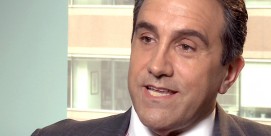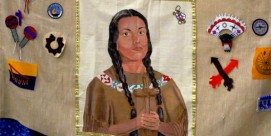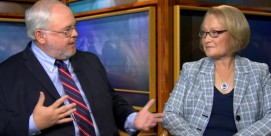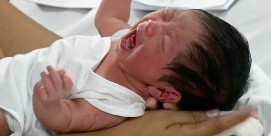In This Episode << SLIDE LEFT TO SEE ADDITIONAL SEGMENTS
Edwin Hernandez Extended Interview
Q: What are the faith-based influences on Hispanic voters, and how important are those influences?
A: The Latino community in this country is clearly a religious community. It’s traditionally been a community that identifies with strong religious values, with strong family values, and religion influences many issues, day-to-day life issues as well as broader public life issues, and some of the research that has been done on Latino public life suggests that religion has a way of influencing the way people think, their attitudes, their behaviors, and how they align themselves politically in this country.
Q: How have Latinos aligned themselves politically, and how has religion affected that?
A: Traditionally Latinos, like other minorities in this country, have aligned themselves politically, the majority, with the Democratic Party over the last 20 years or so. However, that trend has been changing over the last ten years, I would say, and in large part due to its shifting, both demographics as well as shifting political values, and the realignment is drawn between the Catholic and non-Catholic Latino communities. What we see among the Catholic communities is a more entrenched and closely aligned commitments and affiliations with the Democratic Party, while on the other hand the non-Catholic community, Protestant, evangelical, Pentecostal communities, are more aligning themselves more closely with the Republican Party. And this was particularly seen in the last election where a large percentage of Latino voters voted, about 40 percent voted for President Bush’s campaign of 2004.
Q: What issues and motivations fuel that?
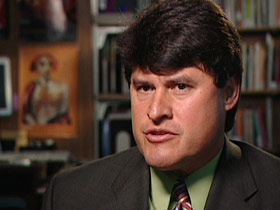
A: Some of the motivations related to this are that Latinos share some core values that seemingly as a group together one would identify them as conservative — conservative on family values, conservative on issues of abortion, conservative on issues of education in terms of strong educational values. Together these key issues of family [and] morality on sexual ethics makes Latinos seem conservative, on these moral issues. On the other hand, there are issues related to education, housing, the job, the economy, and issues that have to do with the bread and butter issues of how can we move up the economic ladder that Latinos align themselves in those other issues in a more progressive, liberal side. The key issue for Latinos and religion on these issues is that it is clear that among the Latino Catholic voters, despite holding some conservative values, [they] are aligned with progressive, more liberal causes, while on the other hand, Latino evangelicals, Pentecostals, while holding also similar conservative moral and political values are beginning to realign themselves more closely with the Republican Party and their platform.
Q: How key has the issue of immigration been in all of this?
A: Recent research from the Pew Hispanic Center suggests that the recent immigration conversations and debates at the national level have significantly impacted the Latino community. For example, a large majority of Latinos in this country say that discrimination has become a greater issue — that Latinos, as a result of these debates and these conversations, have increased discrimination. They also suggest that these events have created the conditions for greater coalition building, for greater unity, that the community — whereas before Latinos have been segmented regionally as well as ethnically. As you know, Latinos are a very diverse community. They are Puerto Rican, Mexican, Cuban, Central American, and these various ethnic groups mean differences of income, of economic status, differences related to religion and differences related to party affiliation. But the recent discussions and events and marches created a sense of unity of cause that has made significant inroads in the creation of potential coalitions of interest that can have far reaching consequences in the political landscape. Perhaps the most telling is the statistic that 75 percent of Latinos in this country say that there will be a significant increase in voter participation in the upcoming elections. Now that is significant, because traditionally Latinos have been not as interested or not as involved politically. Of the total electorate, you know, Latinos who are able to vote, [only] 18 percent of those vote, compared to 39 percent of African Americans and 56 percent of Anglos, for example. So Latinos tend to vote less, but the recent events [have] the potential for increasing the voter pool for Latinos in this country, and that, coupled with the fact that you have a younger population, and by younger meaning a group of young people who — for example, in the last four years from 2000 to 2004, 1.5 million young Latinos became eligible to vote. You have the potential for some significant impact that Latinos vote in this country — but also in the final elections.
Q: Why is immigration so important? How key a moment has this been?
A: The last six months, well, the last year of conversations and debates and marches and public participation — it’s a watershed moment for the Latino community. It’s one of those moments in the life of the community where coalitions are built, where raising of consciousness is created, where a particular group of people realize that if they don’t voice their concerns, if they don’t stand together, organize to say yes, there is a concern around immigration, but we are for the most part law-abiding citizens, productive contributors to this society, our children were born here. We have a lot to contribute to this country, and we want to make sure that our identity and our culture and our humanness is respected and affirmed. So the moment is critical, because the future of this country will increasingly be influenced by Latinos in this country, given the population growth of, given the fact that Latinos represent the largest increase of electoral bloc of potential voters suggest that Latinos in this country, in politics as in other areas of life, will be making increasing impact in significant ways. So it’s a watershed moment that should be carefully heeded by those who are in positions of power, those who have a lot to do with creating coalitions that will last over the lifetime of individuals.
In addition the fact that this is a watershed moment for the Latino communities in terms of bringing different ethnic groups together to work together, bringing greater awareness of their state in this larger society, but there’s also another key factor of this movement that has been created, and that’s the way that people, when they were asked in surveys, did say that this is a new moment, this is a new movement that has been created. But the key factor is that the religious sector, the religious community in this country of the Latinos, both Catholic and non-Catholic, have come together to identify this as a deeply moral issue as well. So this is not just an economic — this is not just a question of rights, a question of the fact that a country has the right to identify its borders, to identify who is a citizen and who’s not, and nobody’s arguing that. But the key thing here is that the coalition of the moral community, of the religious community, around the fact that this is a deeply moral issue, a human rights issue that is of significant importance, that has made them participate as organizers, as individuals to educate the grassroots community on some key issues facing the country.
Q: What are religious leaders saying? How is immigration a moral issue? What are the theological, religious, spiritual, moral foundations of this issue?
A: For the Judeo-Christian community, the question of the stranger living in our midst has a long tradition in scripture, in Old Testament, New Testament, that permeates their understanding of what it means to be a Christian. At the very core of the Christian faith is the notion that how we treat the least of these, those who are strangers in our midst, how we invite them, how we care for them, how we provide for their daily needs, housing, food, care; to that degree we demonstrate the true character of the Christian community. And so for the Latino religious community, the issues of how do we address an increasingly violent border, where because of increased border protection there have over the last ten years been increased deaths of immigrants, because there’s also the question of rights. What rights do individuals who have lived in this country and made this country their home, where their children were born here, where they actively participate in working and providing and contributing, what rights do they have over the long term? So for the religious community, the plight of the undocumented in this country is consistent with this long tradition in scripture of how you treat the alien, the stranger in the midst, that ultimately Christ is found in those, in the least of these and how we treat the least of these we treat Christ. And that, in essence, is the moral call, the moral justification for action and motivation.
Q: How is this bringing together Latino Protestants and Catholics politically?
A: The religious community in this country is clearly divided around many fault lines between denominations, between perspectives on how to address key moral issues facing the country, and clearly the Latino community is no exception to the ways in which denominations tend to divide groups. However, the interesting fact is that the immigration issue and the discussions that have been raised in the last year of discussions and debate has brought Catholic leaders, Protestant leaders, evangelical leaders around the same table to discuss together what should be the response of the religious community. How should we mobilize and educate our parishioners to face these issues? And so at the local level, whether it be in Chicago or New York, L.A., Pentecostal pastors, priests, lay Catholic leaders have come together and joined forces to say we as a community may be divided by faith and other areas, but on this issue we’re coming together because we need to take a stand about the dignity of who Latinos are, because they represent a large part of this community, a large part of the society and the contributions that we’re making. And more importantly we, like many immigrants of generations back, have an equal stake in the future of this country, and we want to have a part of it. So I think the religious community is finding a unique opportunity to voice, to exercise the public responsibilities that heretofore we had not seen before. And this is important because there are many sectors of our religious community, particularly the more conservative evangelical sectors, who had not been as engaged civically or politically, and this represents for them one of those initial opportunities to engage with this sector, to argue or to lobby on behalf of immigration reform, and so that is important, particularly for the more evangelical, conservative sector of the religious community.
Q: What is the fall-out for the political parties? Is that a huge challenge for the Republican Party? And then what are the challenges for the Democrats as well?
A: Findings from the Pew Hispanic Center research of the election of 2004 suggest that the Bush administration, the Republican Party, made significant gains among Latinos in this last election, probably the most ever. About 40 percent of Latinos voted for President Bush. And when you divide that vote among the religious divide, the greatest increase was gained among the evangelical Latino voters. This is important because the political realignment across religion among Latinos is clearly between the Catholic and non-Catholic. And among the non-Catholics, the real divide or the real realignment of affinity towards the Republican Party finds itself around the evangelical and Pentecostal communities, which is the fastest growing sector of the religious community among Latinos in this country. What was very interesting, however, on the most recent 2006 survey of Latinos that the Pew Hispanic Center did suggests that the recent discussions around immigration over the last year or so has not shifted the realignment of Latinos. That is to say as many Latinos are now aligned politically with the Democrats as they are with the Republican Party. There hasn’t been that shift. However, about 40 percent of Latinos now say that the Democratic Party is more Latino-friendly, whereas only 9 percent of Latinos say that the Republican Party is Latino-friendly. So whereas there hasn’t been that realignment of identity of how people identify with a particular political party, there has been a shift on the perception of how a political party is more friendly or not towards the Latino community.
What impact might that have to the future? It’s somewhat unknown. But clearly, clearly this is an issue that for many Latino religious leaders it is worth rethinking their commitments politically. There have been a number of key religious leaders in this country that have gathered together and said to leaders in both political parties, this is an issue of significant importance to us that we’re willing to realign our votes accordingly if you don’t respond to the concerns that we bring to the table. And the concerns that the religious community brings to the table are not any different than concerns of many Americans. Latino religious leaders, and for the most part the parishioners in the pews, are concerned that immigration is out of control, are concerned that things do need to be made clearer, that borders need to be protected, that in this age of increasing terror and risks that there is some legitimate concern [about] borders and orderly processes of immigration. But then not to see Latinos as scapegoated or not to see that there should be a venue, a process whereby unnaturalized citizens, undocumented citizens can find a way to citizenship with the appropriate degrees of both incentives as well as penalties. The thing here is ultimately among both Catholic and evangelical increasingly growing sector is that at the bottom line, what political party responds to the key needs and concerns will ultimately then have their allegiance, and I think that both political parties are understanding that, are hearing and listening carefully because their political futures, to a large extent, will depend upon how these alignments ultimately are figured out.
Q: Are both parties reaching out to this community and indeed recognizing that it’s a key voting bloc, a key community that they need on board?
A: It’s a growing sense that this is true. I think that Latinos have been taken for granted. Latinos are a sleeping giant that has been awakened as a result of these discussions, no doubt about that, and I think both parties’ leadership recognize this to various degrees and are respond accordingly. Perhaps the impact may not be seen in the next few months, but the impact could be seen over the larger spectrum of years and generations — how people’s perceptions of how you treated me, my grandmother, my children, my extended family. Keep in mind that a large sector of the estimated 12 million undocumented in this country have children that have been born here, and those are U.S. citizens. Those are children, you know, two or three million children who will become voters and who will, in the long run, make an impact on how decisions are made in this country.
Q: Right before the 2004 election I did another story looking at Hispanics, and some of the Latino evangelicals told me that for their community the issue of gay marriage was big. Faced with conflicting priorities — Latino voters who are concerned about gay marriage at the same time that they have real concerns about immigration reform — which issue is going to trump the other?
A: Good question. I think the answer to that is still to be seen. It’s a good question that clearly is important and will be important in future decisions in voting, decisions in political realignments of many in the religious sector. But having said that, when you look at the question of immigration, when you have over half of the Latinos in this country saying that discrimination has increased, this discussion around immigration has created what they term a new movement. When it has created alliances across the various ethnic groups, from Cubans in Miami to Puerto Ricans in New York to Mexican-Americans and Chicanos in the Midwest and the West, you have a new moment, because connected to the question of immigration is an issue of dignity, and it’s a question of who you are. How do you stand in the midst of the diversity in this country? It’s a question of defining not just how we should deal with 12 million undocumented, it’s about how do you address and treat 44 million and growing Latinos in this country? My sense is that when these two issues are put together, the questions of immigration and the future of Latinos in this country will play a very important role when people look at political parties and their platforms, because at the very core issue is the question of who are we and how does the rest of society view us? Do they view us as contributing members of this society that brings a lot of important benefits to this country, or are we simply going to be relegated and stereotyped as lawless, as individuals who are simply seeking to benefit without the expense and without contributing as well? It’s a tough issue to know what would trump the other, and I think only time will tell. But at the very core issue the immigration debate is about who we are, and when you put my family, my grandmother, my children — I’m going to protect them, and I’m going to seek their well-being at the expense of any other issue.
Q: Could you outline the specific ways that faith, religious beliefs, a sense of religious community shape Latino attitudes and political motivations?
A: Religion is a key factor in politics in this country, and it is certainly true among Latinos. The church community, for many Latinos — it is the core institution of their community. The church represents a core institution that provides basic services, where they find a home, a sense of belonging. The church is one of those institutions that is owned and operated by the Latino community, and so it is also the place where cultural values are transmitted and preserved and enhanced. Within that setting, the teachings of religious communities enhance and create a greater affinity with issues of family values, increased issues of, for example, abortion, become issues that the clergy and others through their sermons and liturgies accentuate as the pro-life options, as becoming important. Latinos, for example, on the majority tend to be pro-life as a general rule. The cues of clergy play a critical role, what things they hear from Sunday to Sunday, from weekend to weekend, plays a critical role. Take the whole question of the dignity of marriage or the dignity of human life. When those are preached, taught in the context of a local community at church where people participate actively, that has a powerful effect in shaping their attitudes and how they translate those beliefs — whether it be about marriage, whether it be about abortion, whether it be about questions of immigration — to the voting booth, and more so if you participate actively. The more you participate actively in a particular community of faith, the more you’re likely to absorb and internalize those values and translate that into the public life. Now what’s really important about the Latino community and this religious community is that by far the majority of the active, civic-participating individuals, the individuals that volunteer, whether it be for the community, whether it be for the school system in the local district, the far majority of Latinos that volunteer in the community come from the faith community, come from churches, and that fact alone suggests that the civic skills, the motivations, the organizing that takes place within the religious community has a powerful effect in the public sector. It’s not unusual, therefore, for some of the community leaders who are active in organizing politically, who are actively advocating [to] come from Catholic parishes, from local evangelical communities, because it is there where they are gaining the skills necessary, the speaking abilities, the organizing abilities, to make a difference in the public life.

